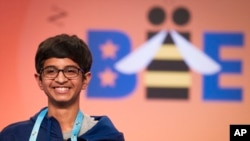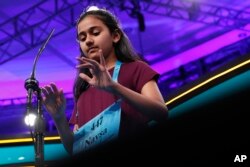Fourteen-year-old Karthik Nemmani of Texas won the Scripps National Spelling Bee Thursday night. His victory was a surprise – even to him.
“I didn’t really think I’d be able to do it,” he said softly. “I had confidence that I could, but I honestly didn’t realistically think it could happen.”
The competition took place in Oxon Hill, Maryland.
Many people had expected another student, Naysa Modi, to win. She had competed and done well in four other national spelling bees. In fact, she had beaten Nemmani earlier this year at a spelling event in Texas. But at the national championship, Modi misspelled “Bewusstseinslage,” a word from the German language.
So Nemmani had the final chance to win. He did – by correctly spelling the word “koinonia.”
The two competitors did not appear to have any hard feelings, however. “We weren’t against each other. We were against the dictionary,” Nemmani said.
By winning, he will take home more than $42,000 worth of prizes.
And Modi, who is only 12, will have one more chance to win the national championship next year. After she finishes the 8th grade, she will be too old to complete.
An unusual year
In addition to the surprise winner, the 2018 National Spelling Bee was unusual in other ways, too. It was the biggest in the 93-year history of the spelling bee. More than 500 children, ages 8 to 15, participated. That is over 200 more than in any other year.
For the first time, the national bee also included new ways for participants to qualify. Most, like second-place winner Naysa Modi, earned their positions by winning several smaller competitions. As a result, Modi’s region paid for her transportation to and from Oxon Hill, hotel and other costs.
But first-place winner Karthik Nemmani, used a new “wild card” program and paid his own way.
The wild card program enables students who did not win their region to participate at the national spelling bee. The program is designed to include more of the country’s best spellers in the national event, especially if they come from a competitive region.
Modi, Nemmani, and the third-place winner, Abhijay Kodali, are from such an area. They all live near Dallas, Texas, a place where many national spelling bee finalists and winners come from. Nemmani’s family even moved there so he could go to a school that takes part in the program.
Nemmani’s victory also shows the power of a new industry of spelling coaches. Nemmani thanked his, a former competitor who is only 16 years old herself.
But there is at least one way in which Nemmani is not unusual. He is the 14th spelling bee champion from an Indian family in each of the past 14 years.
I'm Kelly Jean Kelly.
The AP reported this story. Kelly Jean Kelly adapted it for Learning English. George Grow was the editor.
______________________________________________________________
Words in This Story
spelling bee - n. a contest in which contestants spell words aloud and are removed from the contest when they spell a word wrong
confidence - n. a feeling or belief that you can do something well or succeed at something
dictionary - n. a reference book that contains words listed in alphabetical order
participate - v. to be involved with others in doing something : to take part in an activity or event with others
qualify - v. to have the right to do, have, or be a part of something
region - n. a part of a country
wild card - n. a player or team chosen to fill a place in a competition after the regularly qualified players or teams have all been decided
coach - n. a person who teaches and trains an athlete or performer






